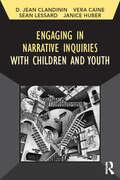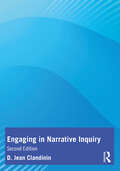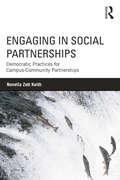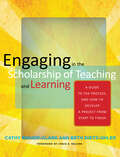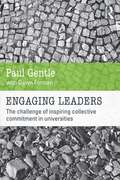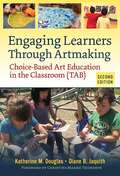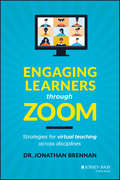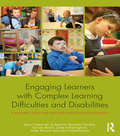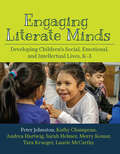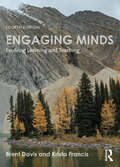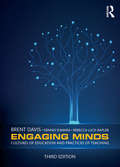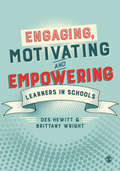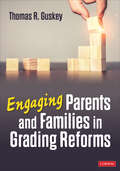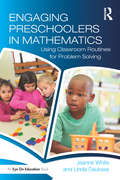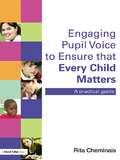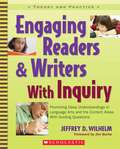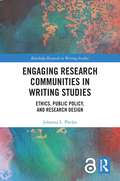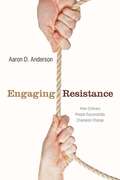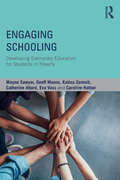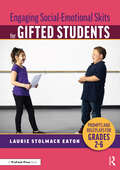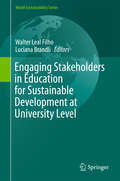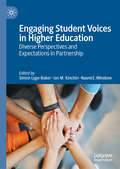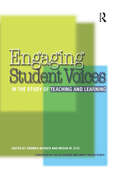- Table View
- List View
Engaging in Narrative Inquiries with Children and Youth (Developing Qualitative Inquiry #16)
by Jean Clandinin Vera Caine Sean Lessard Janice HuberRenowned scholar and founder of the practice of narrative inquiry, D. Jean Clandinin, and her coauthors provide researchers with the theoretical underpinnings and processes for conducting narrative inquiry with children and youth. Exploring the unique ability of narratives to elucidate the worldview of research subjects, the authors highlight the unique steps and issues of working with these special populations. The authors address key ethical issues of anonymity and confidentiality, the relational issues of co-composing field and research texts with subjects, and working within the familial contexts of children and youth; include numerous examples from the authors’ studies and others – many from indigenous communities-- to show narrative inquiry in action; should be invaluable to researchers in education, family relations, child development, and children’s health and services.
Engaging in Narrative Inquiry
by D. Jean ClandininIn Engaging in Narrative Inquiry, Second Edition, D. Jean Clandinin, a pioneer in narrative research, updates her classic formulation on narrative inquiry, clarifying, extending, and refining methods. This updated edition looks at changes and developments in the field since the publication of the first edition in 2013, exploring how narrative inquiry explores human lives through a narrative lens that honors experience as a source of important knowledge and understanding. The book includes several exemplary cases with the author’s critique and analysis of the work. The following are new to this edition: New exemplary cases, including Menon’s autobiographical narrative inquiry as the starting point for framing a research puzzle and justifying a study, Chung’s account of a study that begins with living alongside participants, and a paper from Swanson’s autobiographical narrative inquiry An expanded discussion of the philosophical grounding of narrative inquiry An expanded discussion of relational ethics in narrative inquiry that highlights links to a relational ontology An updated account of the field of narrative inquiry that highlights future directions, including the necessity of response groups, and questions of responsibility and community The increasing interest in narrative inquiry as research methodology across disciplines makes this book an essential guide and an excellent text for graduate courses in qualitative inquiry, education and nursing research, sociology, and all courses in autobiographical and narrative research and inquiry.
Engaging in Social Partnerships: Democratic Practices for Campus-Community Partnerships
by Novella Zett KeithEngaging in Social Partnerships helps practitioners advance democratic engagement by creating spaces where institutions of higher education, community groups, and other organizations can come together. This important book prepares higher education professionals to become reflective practitioners while working in collaborations that span not only the boundaries of organizations, but also borders created by the social divides of class, race, ethnicity, culture, professional expertise, and power. Through illustrative cases, Keith explores effective models of democratic engagement for university-community partnerships, as well as approaches to overcoming obstacles and assessing process and outcome. Current and future professionals in higher education will find this a valuable resource as they explore the power of engaging in collaborations that cross social divides, while enacting practices that are more equitable and democratic.
Engaging in the Scholarship of Teaching and Learning: A Guide to the Process, and How to Develop a Project from Start to Finish
by Cathy Bishop-Clark Beth Dietz-UhlerThis is a book for anyone who has ever considered engaging in the scholarship of teaching and learning – known familiarly as SoTL – and needs a better understanding of what it is, and how to engage in it. The authors describe how to create a SoTL project, its implications for promotion and tenure, and how it fosters:* Increased satisfaction and fulfillment in teaching* Improved student learning* Increased productivity of scholarly publication* Collaboration with colleagues across disciplines* Contributing to a growing and important body of literatureThis guide provides prospective SoTL scholars with the necessary background information, foundational theory, tools, resources, and methodology to develop their own SoTL projects, taking the reader through the five stages of the process: Generating a research question; Designing the study; Collecting the data; Analyzing the data; and Presenting and publishing your SoTL project. Each stage is illustrated by examples of actual SoTL studies, and is accompanied by worksheets to help the reader refine ideas and map out his or her next steps. The process and worksheets are the fruit of the successful SoTL workshops the authors have offered at their institution for many years. SoTL differs from scholarly and reflective teaching in that it not only involves questioning one’s teaching or a teaching strategy, but also formally gathering and exploring evidence, researching the literature, refining and testing practices, and finally going public. The purpose of SoTL is not just to make an impact on student learning, but through formal, peer-reviewed communication, to contribute to the larger knowledge base on teaching and learning. While the roots of SoTL go back some 30 years, it was Ernest Boyer in his classic Scholarship Reconsidered who made the case for the parity of the scholarships of integration, of discovery, of application, and of scholarship of teaching as vital to the health of higher education. Glassick, Huber, and Maeroff ’s subsequent Scholarship Assessed articulated the quality standards for SoTL, since when the field has burgeoned with the formation of related associations, a proliferation of conferences, the launching of numerous journals, and increasing recognition and validation by institutions.
Engaging Leaders: The challenge of inspiring collective commitment in universities
by Dawn Forman Paul GentleAddressing the question of how leadership can work most successfully in universities, Engaging Leaders strengthens the sense of shared professional knowledge and capability amongst leaders in higher education. Presenting a narrative of change which not only spells out why universities need to work differently, this book also takes the reader through clear practical steps which any practising leader can take in order to build a collaborative professional culture which supports and challenges all members of an academic community. Using a selection of case studies from UK and international universities, the book explores why working collectively remains a fundamental challenge for many higher education institutions and looks at the benefits of creating a collective commitment throughout universities. It covers: action learning and professional learning communities emotionally-intelligent organisational cultures feedback as an intrinsic tool building partnerships and collaborations Higher Education and public value cultures of innovation and sustainable practices. Engaging Leaders is for those who see themselves as leaders in higher education, whether or not this is recognised in their job title. It provides stimulating perspectives on what they might do to become more engaged and engaging, and includes examples of inspiring practice which is already making a difference in universities, colleges and new private providers. It will be of value to established managers as well as those new in post, and also for those participating in postgraduate programmes.
Engaging Learners Through Artmaking: Choice-based Art Education In The Classroom (tab)
by Katherine M. Douglas Diane B. Jaquith Christine Marmé ThompsonThe authors who introduced the concepts of Teaching for Artistic Behavior (TAB) and choice-based art education have completely revised and updated their original, groundbreaking bestseller that was designed to facilitate independent learning and support student choices in subject matter and media. More than ever before, teachers are held accountable for student growth and this new edition offers updated recommendations for assessments at multiple levels, the latest strategies and structures for effective instruction, and new resources and helpful tips that provide multiple perspectives and entry points for readers.
Engaging Learners through Zoom: Strategies for Virtual Teaching Across Disciplines
by Jonathan BrennanKeep your virtual students focused and meaningfully engaged with this invaluable teaching resource Engaging Learners through Zoom delivers numerous practical strategies and helpful advice on how to engage students virtually. Many of the tools are also applicable in face-to-face and hybrid environments. Backed by cognitive neuroscience research, this book is a collection of dozens of active, synchronous online learning structures that can be used in any discipline, perfect for K-12 through higher education. This book provides teachers, college educators, administrators, and trainers the antidote to Zoom fatigue! Transform Zoom (or any video-conferencing platform) into an ideal environment for students to focus more fully, learn more effectively and have more fun! Dr. Brennan, accomplished author, professor and distance education expert, improves learner performance and addresses equity in education with: Over 150 active learning strategy examples with step-by-step directions Ideas for including diverse content across 83 different disciplines Multiple examples for 26 of the most commonly taught courses Engaging Learners through Zoom belongs in the collection of every educator who wants to motivate and inspire their students to excel in a virtual learning environment.
Engaging Learners with Complex Learning Difficulties and Disabilities: A resource book for teachers and teaching assistants
by Barry Carpenter Jo Egerton Beverley Cockbill Tamara Bloom Jodie Fotheringham Hollie Rawson Jane ThistlethwaiteChildren and young people with Complex Learning Difficulties and Disabilities (CLDD) have co-existing and overlapping conditions which can manifest in complex learning patterns, extreme behaviours and a range of socio-medical needs which are new and unfamiliar to many educators. Their combination of issues and layered needs – mental health, relationship, behavioural, physical, medical, sensory, communication and cognitive – mean they often disengage from learning and challenge even our most experienced teachers. This book provides school practitioners and leaders with an approach and resources to engage this often disenfranchized group of children in learning. The Engagement for Learning Framework has been developed and trialled by over 100 educational settings (both special and mainstream) with learners from early years to post-16. It gives practitioners from a range of disciplines a shared means of assessing, recording and developing personalized learning pathways and demonstrating progression for these children. The focus on inquiry means that however complex a young person’s needs, educators will be able to apply the approach. This practical and engaging book provides literature, tools and case study examples outlining who children and young people with CLDD are, why their engagement for learning is important and how the Engagement for Learning Framework can be used effectively by teachers and other professionals to ensure the best possible outcomes for these children.
Engaging Literate Minds: Developing Children’s Social, Emotional, and Intellectual Lives, K–3
by Peter Johnston Kathy Champeau Andrea Hartwig Sarah HelmerIncreasingly, educators are recognizing that for children to thrive intellectually they need socially and emotionally healthy classrooms. Conveniently, this is exactly what parents have always wanted for their children's classrooms that offer and grow positive relationships and behavior, emotional self-regulation, and a sense of well-being. Using the guiding principles from Peter Johnston's best-selling professional resources, Choice Words and Opening Minds,Peter and six colleagues began a journey to create just such classrooms'senvironments in which children meaningfully engage with each other through reading, writing, making, and discussing books. Together, they bring you Engaging Literate Minds: Developing Children's Social, Emotional, and Intellectual Lives, K-3 where you'll discover how these teachers struggled and succeeded in building such classrooms. Inside you'll find the following: Practical ways to develop a caring learning community and children's socio-emotional competencePowerful teaching practices from real classroomsEngaging ways to encourage inquiry and student agencySuggestions on how to use formative assessment in everyday teaching practicesHelpful research behind the classroom practices and children's developmentWays to help students inspire and support each otherBuilding a just, caring, literate society has never been more important than it is today. By embracing the ideas and teaching strategies Engaging Literate Minds, you can help children to become socially, emotionally, and intellectually healthy. Not only do these classroom practices develop the skills to achieve district benchmarks and beyond, they help develop children's humanity.
Engaging Minds: Evolving Learning and Teaching
by Brent Davis Krista FrancisEngaging Minds: Evolving Learning and Teaching explores the diverse beliefs and practices that define the current landscape of formal education. The revised, updated, and expanded fourth edition of this groundbreaking introduction to current interdisciplinary studies of teaching and teacher education is structured around five prominent "frames" of formal education, together offering an overview of the historical and conceptual influences on educational practice: Early Formal Education – likely emerged alongside the creation of origin myths and the invention of symbol-based writing systems, presenting needs for individuals charged with communicating, interpreting, and maintaining such knowledge; Standardized Education – began to unfold in the 1600s, when public education was invented as a response to the cultural convulsions of industrialization, urbanization, and imperialism; Authentic Education – rose to prominence over the last century as researchers began to untangle the complexity of human cognition; Democratic Citizenship Education – fuelled by civil rights movements of the 1960s, with the realization that schools often contribute to (or at least help to perpetuate) inequities and injustices; Systemic Sustainability Education – an emerging trend, as schools and other cultural institutions find themselves out of step with the transition from a mechanization-focused industrialized society to an ecologically-minded and information-based society. These frames serve as the foci of the five chapters of the book, each with three sections that deal, respectively, with history, epistemology, and pedagogy within the frame. Richly illustrated and designed, additional pedagogical features include multiple strategies to highlight and distinguish important vocabulary in the text, as well as suggestions for delving deeper into a given topic. The fourth edition is also complemented by an online resource, learningdiscourses.com, that provides analyses of more than two thousand discourses on learning in education – including summaries and critiques, along with details on their authorship, their imagery, and their associated discourses.
Engaging Minds: Cultures of Education and Practices of Teaching
by Brent Davis Dennis Sumara Rebecca Luce-KaplerEngaging Minds: Cultures of Education and Practices of Teaching explores the diverse beliefs and practices that define the current landscape of formal education. The 3rd edition of this introduction to interdisciplinary studies of teaching and learning to teach is restructured around four prominent historical moments in formal education: Standardized Education, Authentic Education, Democratic Citizenship Education, Systemic Sustainability Education. These moments serve as the foci of the four sections of the book, each with three chapters dealing respectively with history, epistemology, and pedagogy within the moment. This structure makes it possible to read the book in two ways – either "horizontally" through the four in-depth treatments of the moments or "vertically" through coherent threads of history, epistemology, and pedagogy. Pedagogical features include suggestions for delving deeper to get at subtleties that can’t be simply stated or appreciated through reading alone, several strategies to highlight and distinguish important vocabulary in the text, and more than 150 key theorists and researchers included among the search terms and in the Influences section rather than a formal reference list.
Engaging, Motivating and Empowering Learners in Schools
by Des Hewitt Brittany WrightSuccessful teachers are able to motivate and inspire the children they teach and this is a skill that can only be supported by understanding good practice. This book gives you smart, pragmatic guidance backed by evidence-based research on how to engage and inspire in your teaching. It looks at both how you can influence and shape the learning that goes on in your classroom and how you can apply key lessons to your own professional development as a teacher. Key coverage includes: · The psychology of motivation and its implications for the classroom · Behaviour for learning · Essential advice on of safeguarding, mental health and wellbeing · Active learning and engaging your pupils in the learning process · How to develop as a professional and empowered teacher
Engaging, Motivating and Empowering Learners in Schools
by Des Hewitt Brittany WrightSuccessful teachers are able to motivate and inspire the children they teach and this is a skill that can only be supported by understanding good practice. This book gives you smart, pragmatic guidance backed by evidence-based research on how to engage and inspire in your teaching. It looks at both how you can influence and shape the learning that goes on in your classroom and how you can apply key lessons to your own professional development as a teacher. Key coverage includes: · The psychology of motivation and its implications for the classroom · Behaviour for learning · Essential advice on of safeguarding, mental health and wellbeing · Active learning and engaging your pupils in the learning process · How to develop as a professional and empowered teacher
Engaging Parents and Families in Grading Reforms
by Thomas R. GuskeyImprove grading practices with support from families Educators seeking to transform age-old grading practices face numerous challenges, particularly when it comes to gaining support from students’ families. This practical guide from a world-renowned expert on grading and assessment practices offers concrete strategies to turn parents and families into trusted partners in grading reform efforts. The book enables educators to anticipate, understand, and effectively address families′ concerns over grading reforms and build trust through authentic engagement. With clear and actionable strategies that educators can implement right away, the easily digestible chapters unpack the complexities of the change process, clarify the purpose of grading, and show how to enhance the use of computerized grading programs. Other features include: Strategies to ease opposition to grading reform from parents and families Insights into how to improve report cards Guidance on how to effectively communicate student performance with parents and families A must-have resource for educators navigating the challenging journey of grading reform, Engaging Parents and Families in Grading Reform is a comprehensive guide to grading reform that emphasizes family engagement to ensure success.
Engaging Parents and Families in Grading Reforms
by Thomas R. GuskeyImprove grading practices with support from families Educators seeking to transform age-old grading practices face numerous challenges, particularly when it comes to gaining support from students’ families. This practical guide from a world-renowned expert on grading and assessment practices offers concrete strategies to turn parents and families into trusted partners in grading reform efforts. The book enables educators to anticipate, understand, and effectively address families′ concerns over grading reforms and build trust through authentic engagement. With clear and actionable strategies that educators can implement right away, the easily digestible chapters unpack the complexities of the change process, clarify the purpose of grading, and show how to enhance the use of computerized grading programs. Other features include: Strategies to ease opposition to grading reform from parents and families Insights into how to improve report cards Guidance on how to effectively communicate student performance with parents and families A must-have resource for educators navigating the challenging journey of grading reform, Engaging Parents and Families in Grading Reform is a comprehensive guide to grading reform that emphasizes family engagement to ensure success.
Engaging Preschoolers in Mathematics: Using Classroom Routines for Problem Solving
by Jeanne White Linda DauksasEngaging Preschoolers in Mathematics is a guide for teachers and childcare professionals working at the Pre-K level that focuses on engagement with the process standards written by the National Council of Teachers of Mathematics. You will learn how to support young children mathematically, use developmentally appropriate mathematical language, and integrate learning activities into your classroom routines that support mathematical content standards. Examples of literacy activities that connect with math are provided throughout the book, as well as learning activities that extend beyond the classroom.
Engaging Pupil Voice to Ensure that Every Child Matters: A Practical Guide
by Rita CheminaisPupil voice is at the heart of Every Child Matters and is the driving force in acknowledging the rights, voice and choice of children and young people today. This very practical up-to-the-minute book is an invaluable and essential resource for all those working directly with pupils in schools and other educational settings, who wish to strengthen the engagement of pupil voice in their every day practice. This book covers: the origin, concept and principles of pupil voice the rights of children and young people in society today how the latest pupil voice national surveys and reports inform ECM practice at whole school, classroom and community levels effective practical approaches for gathering pupils views and enhancing their participation to inform and influence ECM decision-making evaluating the impact and outcomes of pupil voice on effecting change, in line with OFSTED and other national standards requirements. Featuring helpful checklists, models of good practice, templates and photocopiable resources that can be used in pupil voice developmental work, this accessible user-friendly guide is packed with useful information and advice, as well as offering suggestions for further reading, websites and resources. Those who will find this book useful are leaders and managers of Every Child Matters, trainee and experienced teachers, teaching assistants, learning mentors, leading teachers and co-ordinators for Personalised Learning, PSHE and Citizenship, local authority Children’s Services professionals working directly with schools, and lecturers in higher education. If every child and young people’s views really matter, then every educational setting will value using this book.
Engaging Readers and Writers With Inquiry: Promoting Deep Understandings in Language Arts and the Content Areas With Guiding Questions
by Jeffrey D. WilhelmWhat makes a good relationship? How does flight influence behavior for humans and birds? Is it ever permissible to lie? Reframing our units and lessons with questions such as these makes learning more exciting for students. Wilhelm debunks the myth that teaching through inquiry is hard. He shares practical, easy ideas for turning state standards into engaging authentic questions that propel students toward deep understandings. Includes sample lessons, discussion techniques, and questioning schemes for all the content areas. For use with Grades 4 and up.
Engaging Research Communities in Writing Studies: Ethics, Public Policy, and Research Design (Routledge Research in Writing Studies)
by Johanna PhelpsThis book invites readers to reconsider how writing studies researchers work with Institutional Review Boards (IRBs) on behalf of their communities and argues that engaging with IRBs during the research design process helps practitioners conduct research more quickly and effectively. Using empirical data from both writing studies and extra-disciplinary contexts, Dr. Johanna Phelps presents findings from two discipline-wide studies, as well as metadata from two IRBs, to develop a principled engagement framework for writing studies researchers to interact with their communities. Phelps further examines the many facets of conducting research with human participants—from comprehending federal policy updates to pondering specific ethical issues to developing detailed research designs—and explores the confluence of ethics, policy, and methodology in a thoroughgoing philosophical investigation of writing studies as a public good. This engaging and timely exploration of research design will be an important resource for scholars and students of writing studies; rhetoric and composition; technical and professional communication; cultural rhetoric; literacy studies; research design; research methodologies; research ethics; IRBs; justice; and critical theory. Chapter 4 and Interchapter 4 of this book are freely available as a downloadable Open Access PDF under a Creative Commons Attribution-Non Commercial-No Derivatives 4.0 license https://www.taylorfrancis.com/books/engaging-research-communities-writing-studies-johanna-phelps/10.4324/9781003082002?context=ubx&refId=07fec855-89cc-48d3-b893-fbcd53272512. Chapter 6 and Interchapter 6 of this book are freely available as a downloadable Open Access PDF under a Creative Commons Attribution-Non Commercial-No Derivatives 4.0 license https://www.taylorfrancis.com/books/engaging-research-communities-writing-studies-johanna-phelps/10.4324/9781003082002?context=ubx&refId=07fec855-89cc-48d3-b893-fbcd53272512.
Engaging Resistance: How Ordinary People Successfully Champion Change
by Aaron D. AndersonEngaging Resistance: How Ordinary People Successfully Champion Change offers an empirically based explanation that expands our understanding about the nature of resistance to organizational change and the effects of champion behavior. The text presents a new model describing how resistance occurs over time and details what change proponents can do throughout three engagement periods to effectively work with hesitant colleagues. The book's findings are illuminated by examples of six different resistance cases, embedded in the transformation sagas of two real-world organizations. A fundamental premise of this work is that resistance should not be something to avoid or squash as people work to change their organizations. In fact, resistance can be viewed as a natural, healthy part of an organic process. When engaged properly, resisters can help to improve change efforts and strengthen an organization's overall transformation.
Engaging Schooling: Developing Exemplary Education for Students in Poverty
by Wayne Sawyer Geoff Munns Katina Zammit Catherine Attard Eva Vass Caroline HattonIn Engaging Schooling, the authors use case studies to engagingly demonstrate how schools can use pedagogical change to enable students from low SES backgrounds to benefit academically and socially from their schooling. The book, which builds on Exemplary Teachers of Students in Poverty from the same research team, deals with key issues around the reshaping of schooling and teaching, focusing on structures for mentoring and research practice among teachers. It significantly advances international literature that highlights the role of pedagogy for engagement in the educational success of students from low SES backgrounds. Moving beyond the individual classroom to focus on whole-school change, the book provides a clearer picture of processes which schools might undergo to engage students in low SES contexts, including teacher research, mentoring practices, instructional leadership and classroom discourses. The book will be of interest to all students, teachers and professional researchers in the field of teacher education.
Engaging Social-Emotional Skits for Gifted Students: Prompts and Roleplays for Grades 2-6
by Laurie Stolmack EatonEngaging Social-Emotional Skits for Gifted Students gives you all the tools you need to help gifted children expand social skills and develop a better understanding of self, peer relations, task commitment, and leadership through insightful, engaging roleplay! Presented in an easy-to-read, conversational style using real-world examples, these open-ended roleplay scenarios teach students how to recognize, monitor, and adjust their behavior. Covering topics from anxiety to patience to teasing and cooperation, each skit includes a problem that invites students to develop their own solutions and takeaways from the situation. Ideal for learners in grades 2–6, these skits allow gifted students to engage with social-emotional learning, making tackling difficult social and emotional issues nonthreatening and fun.
Engaging Stakeholders in Education for Sustainable Development at University Level
by Walter Leal Filho Luciana BrandliThis book discusses the role of ESD stakeholders at university level, involving civil society and the private sector and public sectors (including local, national and intergovernmental bodies). In particular, it describes practical experiences, partnerships, networks, and training schemes for increasing the capacity of ESD and other initiatives aimed at promoting education for sustainable development taking place at institutions of higher education. In order to meet the pressing need for publications that may promote stakeholders' involvement in ESD in higher education, the book particularly focuses on state-of-the-art approaches, methods, initiatives and projects from around the world, illustrating the contribution of different stakeholder groups to sustainable development in higher education on an international scale.
Engaging Student Voices in Higher Education: Diverse Perspectives and Expectations in Partnership
by Simon Lygo-Baker Ian M. Kinchin Naomi E. WinstoneThis book examines the importance of exploring the varied and diverse perspectives of student experiences. In both academic institutions and everyday discourse, the notion of the ‘student voice’ is an ever-present reminder of the importance placed upon the student experience in Higher Education: particularly in a context where the financial burden of undertaking a university education continues to grow. The editors and contributors explore how notions of the ‘student voice’ as a single, monolithic entity may in fact obscure divergence in the experiences of students. Placing so much emphasis on the ‘student voice’ may lead educators and policy makers to miss important messages communicated – or consciously uncommunicated – through student actions. This book also explores ways of working in partnership with students to develop their own experiences. It is sure to be of interest and value to scholars of the student experience and its inherent diversity.
Engaging Student Voices in the Study of Teaching and Learning
by Carmen Werder, Megan M. Otis, Pat Hutchings, Mary Taylor HuberThis book addresses the all-important dimensions of collaboration in the study of learning raised by such questions as: Should teachers engage students directly in discussions and inquiry about learning? To what extent? What is gained by the collaboration? Does it improve learning, and what do shared responsibilities mean for classroom dynamics, and beyond?Practicing what it advocates, a faculty-student team co-edited this book, and faculty-student (or former student) teams co-authored eight of its eleven chapters. The opening section of this book explores such dimensions of student voices in the scholarship of teaching and learning (SoTL) as power and authority in the classroom, collaborative meaning-making, and the role of students as both learners and experts on their own learning. It opens up the process of knowledge-building to a wider group of participants, and expands our conception of who has expertise to contribute – for instance recognizing students’ “insider” knowledge of themselves as learners. Using various institutional models to illustrate these foundational concepts, part one provides a context for understanding the detailed examples that follow. The case studies in the second half of the volume illustrate how these concepts play out inside and outside the classroom when students shift from serving as research subjects in a SoTL study to working as independent researchers or as partners with faculty in such work as studying curricular design/redesign, readings, requirements, and assessment. This co-inquiry brings the principles and benefits of the broader undergraduate research movement to the topic of teaching and learning. It also increases student researchers’ sense of themselves as independent learners. While recognizing the impossibility of engaging every student in the scholarship of teaching and learning in every course, the editors and contributors make the case for making such opportunities available as broadly as possible because, as this volume also makes clear, this is transformational work – with the potential to produce paradigm shifts, turning points, new insights, and changes in classroom culture – for both faculty and students. The contributors demonstrate how they validated student voices in theory, method, and methodology across a wide variety of disciplines and while engaging with different pedagogies. Disciplinary examples include: anthropology, communication, chemistry, criminal science, education, English, geography, history, human services, mathematics, psychology, sociology, theater arts, philosophy, and political science.
